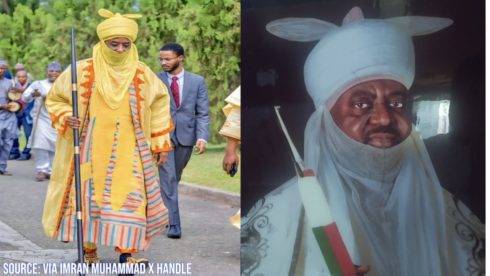The Kano State Police Command has announced that Emir Muhammad Sanusi II is scheduled to lead the Friday prayers at the central mosque, rather than Emir Aminu Bayero. This development comes amidst ongoing tensions and power struggles within the Kano Emirate Council.
Police Commissioner Usaini Gumel stated on Friday that Emir Bayero will be attending his Friday prayers at the mosque located within the Nasarawa Palace, where he is currently residing. The police chief emphasized that ample security measures would be in place at the Emir of Kano’s palace for the Jummah prayers led by Emir Sanusi, with support from state security agencies.
Police Command: Police Dismiss Social Media Rumors, Assure Public Safety
In a bid to quell potential unrest and address public concerns, Commissioner Gumel urged the general public to disregard false reports and misinformation circulating on social media platforms. He assured residents that they can go about their activities without fear of molestation or intimidation.
“The Police Comand urge the general public to disregard the false reports and misinformation circulating on social media and go about their activities without fear of molestation or intimidation,” Gumel stated. “The police will continue to provide necessary security to ensure that residents will be able to observe their Friday congressional prayers peacefully without threats to their lives and property.”
Police Command: Heightened Security Measures for Friday Prayers
To maintain law and order during the Friday congregational prayers, the Kano State Police Command has implemented heightened security measures. This includes the deployment of additional personnel and resources to ensure the safety of worshippers and prevent any potential disruptions or clashes.
The Police Command have emphasized their commitment to providing a secure environment for the peaceful observance of religious activities. They have called for cooperation from the public and urged citizens to remain vigilant and report any suspicious activities to the appropriate authorities.
Tensions within Kano Emirate Council
The decision regarding who will lead the Friday prayers at the central mosque in Kano highlights the ongoing tensions and power struggles within the Kano Emirate Council. The council has been embroiled in controversies and disputes over leadership and authority in recent times.
While Emir Sanusi is set to lead the prayers at the central mosque, Emir Bayero’s decision to hold prayers at the Nasarawa Palace underscores the divisions within the council. The situation has raised concerns among the public and sparked debates over the role and influence of traditional institutions in the state.
Call for Peaceful Resolution and Dialogue
As the situation unfolds, there have been calls for a peaceful resolution and open dialogue among the various stakeholders involved. Religious leaders, civil society organizations, and community representatives have urged all parties to exercise restraint and prioritize the well-being of the people.
Many have emphasized the need for reconciliation and a constructive approach to addressing the underlying issues within the Kano Emirate Council. They have called upon the relevant authorities to engage in meaningful dialogue and find a lasting solution that upholds the principles of justice, unity, and the rule of law.
Kano Emirate: Implications for Governance and Traditional Institutions
The ongoing tensions within the Kano Emirate Council have broader implications for governance and the role of traditional institutions in the state. The situation has brought into focus the complex dynamics between modern governance structures and traditional authorities, as well as the need for clarity and harmonization of roles and responsibilities.
As the events unfold, stakeholders and observers will be closely monitoring the situation, assessing its impact on the social fabric, cultural heritage, and overall stability of the state. The resolution of these issues will have significant implications for the future of traditional institutions and their relationship with the government and the people they serve.
Table of Contents
Discover more from OGM News NG
Subscribe to get the latest posts sent to your email.














